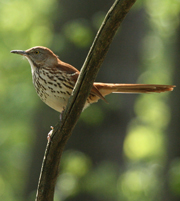Level: High School Physics
What is the speed of a sailboat that is traveling 100 meters in 120 seconds?
Hint: What is the equation to calculate velocity?
Level: Middle School
List the planets of our solar system in order in distance from the sun (closet to furthest).
Level: 2nd Grade Science
List 3 common states of matter.
November: Leonid Meteor Shower As comets orbit the Sun, they leave trails of "comet crumbs" - tiny bits of dust and ice, about the size of a grain of sand - behind them in space. Earth's orbit intersects several of those crumby paths throughout the year. As gravity pulls the bits toward Earth's surface, they rush through the upper atmosphere, exciting gases and making them glow. We see that streak of light as a "shooting star." Shooting stars, or meteors, are visible almost any night, several per hour. During meteor showers, the chances are good for seeing dozens or more per hour. Check the sky between midnight, November 17 and 4:00 a.m. Sunday the 18th for the Leonid meteor peak.
Additional Newsletters
"Upon A Midnight Clear" by Jonn Serrie.
Friday, December 7, 2012 at 8:00 p.m.
Fernbank Science Center's Jim Cherry Memorial Planetarium
Teachers admitted for free with their DeKalb ID!
All other adults $5.00.
Teacher Staff Development Trips
- 11/10: Cartersville-Roadside Geology
- 12/8: Clinchfield Mine and Mounds
Search "Fernbank" in IDMS/SCHOOLNET for more information
Monarchs are migrating through Georgia!
Citizen scientists track the monarch butterfly migration each fall and spring as the monarchs travel to and from Mexico. Report your own observations of migrating butterflies to real-time migration maps. Share data to help scientists understand how monarchs respond to climate and changing seasons. Explore the monarch butterfly life cycle, ecology, habitat and conservation needs.
Visit http://www.learner.org/jnorth/monarch/ to learn more about how you can help.
Science Article of the Month
Can your body sense future events without any external clue? Wouldn't it be amazing if our bodies prepared us for future events that could be very important to us, even if there's no clue about what those events will be? "Presentiment," as in "sensing the future," without any external clues may exist, according to new research that analyzes the results of 26 studies published between 1978 and 2010. Read More >> | More articles >>
Do you have a question or a suggestion?
Please email us at:
fernbankmail@fc.dekalb.k12.ga.us

Staff Development
Opportunities
![]()
Children's Science
Newsletters
Bird of the Month

Can you I.D. this Bird?
Get the answer in the next issue.
Previous Issue's Bird: Yellow-bellied Flycatcher
Tree or the Month
Can you I.D. this colorful
small tree? Clues: it has brilliant red fall foliage, it's stem is often oval in crossection and it is a favorite source of nectar for honeybees. Get the answer in the next issue.



